Results
-
 £371.99
£371.99Essential Musicianship for Band
Essential Musicianship for Band is the perfect tool to assist your ensemble in developing the skills needed to read, rehearse, and perform band repertoire with precision and artistry. Using proven methods for superior sound production and ensemble technique, your students will transform printed notes into a meaningful musical experience. Fits easily into the traditional concert band setting. Masterwork Studies, a first-of-its-kind textbook for high school band, focuses on six landmark compositions for symphonic band*. Two CD-ROMs are included, featuring: 1. Exemplary recordings of each work, performed by some of the world's finest ensembles 2. Practice loops on the more difficult passages for each instrument, along with tempo adjustment software, on-screen assessment, and a built-in metronome 3. Scale, arpeggio, and articulation studies in all keys *Score and parts not included Also available in the Essential Musicianship curriculum: Ensemble Concepts - Designed to help intermediate to advanced ensembles acquire maximum performance skills while increasing overall musicianship. Every aspect of ensemble development is introduced individually, in developmental order, then combined for more advanced practice. Ensemble Concepts - Fundamental Level (1st and 2nd year students) Ensemble Concepts - Intermediate Level (2nd and 3rd year students)
Estimated dispatch 7-14 working days
-
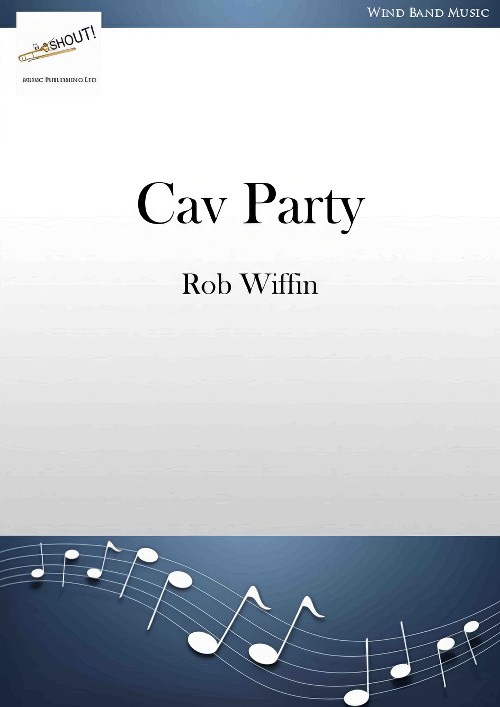 £49.95
£49.95Cav Party (Concert Band - Score and Parts) - Wiffin, Rob
Cav Party was commissioned by The Band of the Household Cavalry in 2020. The idea was to showcase the various musical elements of the band in a party piece that gets more boisterous as it goes on. It utilises three Eighteenth century melodies associated with the band, starting off with a folkish setting of Handel's March from Scipio for harp, violin, flute and cor anglais (all fully cued on regular wind band instruments) and then into Keel Row where the accordion is featured before the whole band enters, and finally to Money Musk. Both Keel Row and Money Musk are played as Trot Marches by the band.The regimental slow march Scipio comes from Handel's opera of 1725 The Mercy of Scipio, which was based on the life of the Roman General Scipio Africanus.Keel Row is a traditional folk song evoking the life and work of the keelmen of Newcastle upon Tyne. It was first published in 1770, although it could be considerably older. The opening lines of the song describe Sandgate, the part of the quayside overlooking the River Tyne to the east of the city centre where the keelmen lived.Money Musk, also known as Monymusk or Monnymusk was originally a pipe tune composed by Scottish fiddler Daniel (sometimes Donald) Dow (1732 - 1783) in 1776. It takes its name from a baronial estate in Aberdeenshire, Scotland called Monymusk House. The tune first appeared in Dow's Thirty Seven New Reels, c. 1780 under the title Sir Archibald Grant of Monemusk's Reel.Duration: 3.45
Estimated dispatch 7-14 working days
-
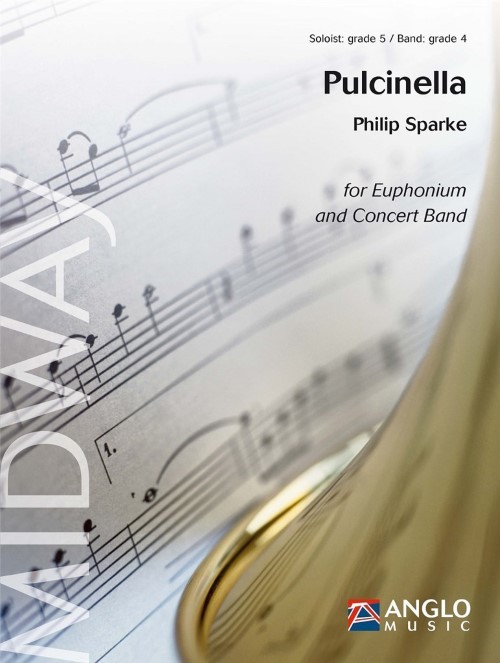 £141.99
£141.99Pulcinella (Euphonium Solo with Concert Band - Score and Parts) - Sparke, Philip
Pulcinella was commissioned by the Taiwanese euphonium player Tzu-Hsiang Lin. Lin is a renowned soloist and teacher and a Besson Euphonium Artist. He teaches euphonium at Taipei National University of the Arts, National Taiwan University of Arts, Shih Chien University and National Kaohsiung Normal University. Lin gave the premiere of Pulcinella in both its concert band and brass band versions in January 2021. Pulcinella continues Sparke's series of euphonium solos named after characters of the Italian commedia dell'arte and opens with a long and expressive minor melody for the soloist over a brooding accompaniment. This is taken up briefly by the full band and is extended by the soloist after a change of key. A cadenza, accompanied by fragments of the main melody leads to a complete change of mood, tempo and tonality, introducing a Vivo section starting with a perky syncopated tune for the soloist. The band then uses elements of this new tune to introduce a change of key, where the soloist introduces a more lyrical second subject over a pulsing accompaniment. The band then takes this up and changes key to reintroduce the original Vivo melody, which leads to a short and acrobatic coda to bring the work to a spectacular close. Duration: 6.45
Estimated dispatch 7-14 working days
-
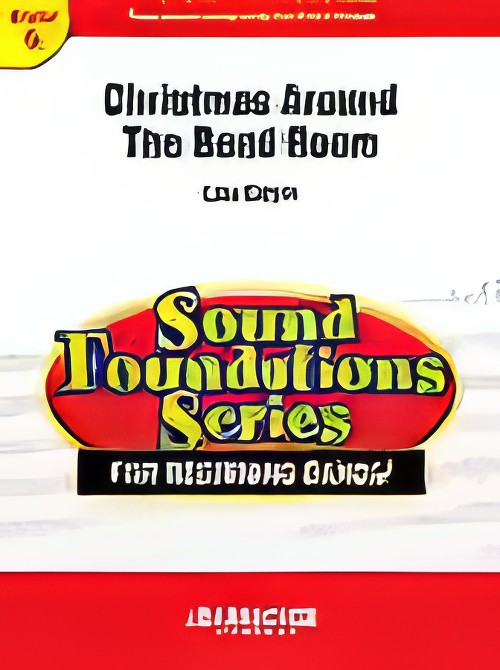 £45.00
£45.00Christmas Around the Band Room (Concert Band - Score and Parts) - Galvin, Lisa
Who says easy can't be fun? "Christmas Around the Band Room" is a satisfying medley of three holiday favorites, giving every section of the band an opportunity to be spotlighted with the melody! Even the youngest ensembles will gain independence and confidence as they prepare this cleverly-scored full band arrangement using only the first six notes of instruction. This would be an ideal choice for your young band's first holiday concert! Duration: 2.00
Estimated dispatch 7-14 working days
-
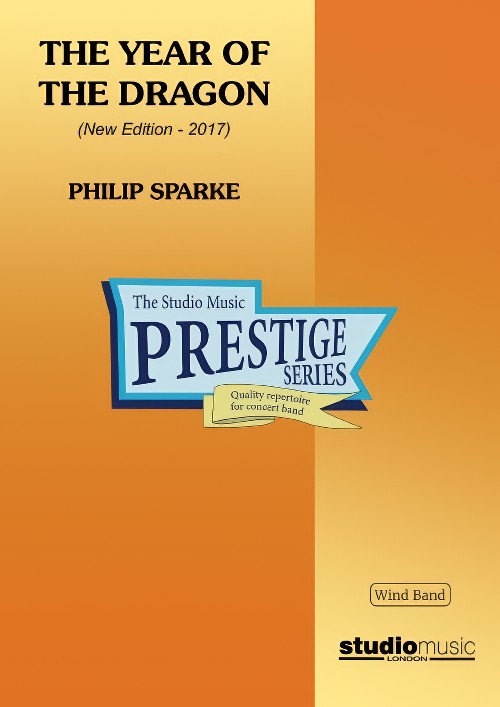 £37.95
£37.95The Year of the Dragon (Prestige Concert Band - Score only) - Sparke, Philip
The 2017 version of The Year of the Dragon was commissioned by the Siena Wind Orchestra and given its world premiere on June 17th 2017 in Bunkyo Civic Hall, Tokyo, conducted by the composer.The original wind band arrangement of The Year of the Dragon was made in 1985, a year after the composer wrote the brass band version. At that time he was still learning the intricacies of writing for wind band (and still is!) and in the 32 years which have elapsed since then, his approach to scoring for the medium has developed and, hopefully, improved.Here are the main differences between the two versions:In the 1980's, the wind band movement was much less international than it is now. British wind bands were still to some extent based on the military band tradition of the time, which tended to use rather smaller instrumentation than the then-dominant American university model. The new version embraces a much more international instrumentation, including low woodwinds and string bass, as well as an expanded percussion section.In the original version there was a touch of naivety in the way the composer wrote for the woodwinds; much of their articulation was transferred too literally from the brass version, resulting in some unidiomatic writing, which he has tried to improve in the new version.In addition to the above, Philip's own compositional style has matured and developed in the intervening 32 years. There are some passages in the original which he simply would not write today - not because they are 'wrong', but because his way of writing has changed. The new version is perhaps how he would have written it today, rather than simply dressing the original version in new clothes.The work is in three movements:Toccata opens with an arresting side drum figure and snatches of themes from various sections of the band, which try to develop until a broad and powerful theme from the middle of the band asserts itself. A central dance-like section soon gives way to the return of this theme, which subsides until faint echoes of the opening material fade to a close.Interlude takes the form of a sad and languid solo for alto saxophone. A chorale for the whole band introduces a brief spell of optimism but the saxophone solo returns to close the movement quietly.Finale is a real tour-de-force for the band with a stream of rapid semi-quavers running throughout the movement. The main theme is heroic and march-like but this is interspersed with lighter, more playful episodes. A distant fanfare to the sound of bells is introduced and this eventually returns to bring the work to a stirring close.
Estimated dispatch 7-14 working days
-
 £199.95
£199.95The Year of the Dragon (Prestige Concert Band - Score and Parts) - Sparke, Philip
The 2017 version of The Year of the Dragon was commissioned by the Siena Wind Orchestra and given its world premiere on June 17th 2017 in Bunkyo Civic Hall, Tokyo, conducted by the composer.The original wind band arrangement of The Year of the Dragon was made in 1985, a year after the composer wrote the brass band version. At that time he was still learning the intricacies of writing for wind band (and still is!) and in the 32 years which have elapsed since then, his approach to scoring for the medium has developed and, hopefully, improved.Here are the main differences between the two versions:In the 1980's, the wind band movement was much less international than it is now. British wind bands were still to some extent based on the military band tradition of the time, which tended to use rather smaller instrumentation than the then-dominant American university model. The new version embraces a much more international instrumentation, including low woodwinds and string bass, as well as an expanded percussion section.In the original version there was a touch of naivety in the way the composer wrote for the woodwinds; much of their articulation was transferred too literally from the brass version, resulting in some unidiomatic writing, which he has tried to improve in the new version.In addition to the above, Philip's own compositional style has matured and developed in the intervening 32 years. There are some passages in the original which he simply would not write today - not because they are 'wrong', but because his way of writing has changed. The new version is perhaps how he would have written it today, rather than simply dressing the original version in new clothes.The work is in three movements:Toccata opens with an arresting side drum figure and snatches of themes from various sections of the band, which try to develop until a broad and powerful theme from the middle of the band asserts itself. A central dance-like section soon gives way to the return of this theme, which subsides until faint echoes of the opening material fade to a close.Interlude takes the form of a sad and languid solo for alto saxophone. A chorale for the whole band introduces a brief spell of optimism but the saxophone solo returns to close the movement quietly.Finale is a real tour-de-force for the band with a stream of rapid semi-quavers running throughout the movement. The main theme is heroic and march-like but this is interspersed with lighter, more playful episodes. A distant fanfare to the sound of bells is introduced and this eventually returns to bring the work to a stirring close.
Estimated dispatch 7-14 working days
-
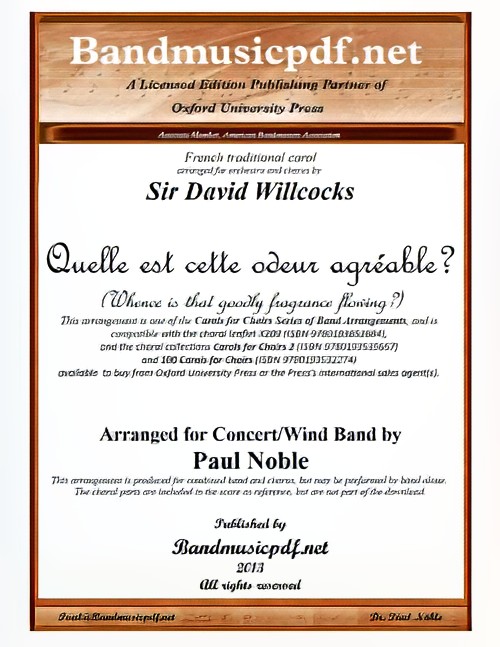 £75.00
£75.00Quelle est Cette Odeur Agreable (Whence is That Goodly Fragrance Flowing?) (Concert Band with Optional Choir - Score and Parts) - Noble & Willcocks
The original setting of this beautiful melody was for Strings and Chorus. This Concert/Wind Band version features the brass ensemble, the woodwind choir, as well as the full band. It is intended for combined Band and Chorus, but may be performed by Band alone. It is completely compatible with the published choral edition, except that it is written one-half step lower (E-flat instead of E major). There are no accidentals, and, apart from the instructions for andante and legato, the phrasing is left to the conductor. The simplicity and rich harmonic structure make this an important addition to the repertoire of young bands, and a perfect piece for any band to program for the Christmas season.
Estimated dispatch 7-14 working days
-
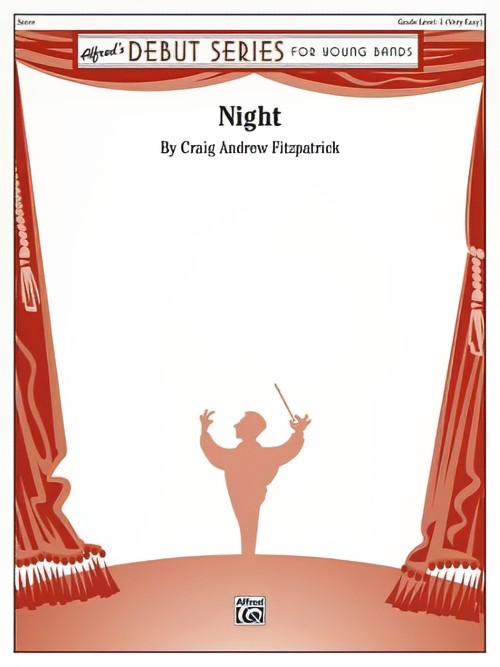 £44.50
£44.50Night (Concert Band - Score and Parts) - Fitzpatrick, Craig
Night is the result of a collaborative project between the composer and the 6th grade beginning band directed by his wife in Morton, Illinois. The students in her band class each write an eight-measure melody as a composition project which is part of the beginning band curriculum. These melodies each start and end on concert B-flat and use only the notes the students have learned on their instruments. The class voted on the best melody, and the winner was "Majestic Night, Oh Winter Night" by Sarah Gunter. The students then observed how this melody was developed by the composer into a concert band piece that they would perform later that year. Compositional terms such as repetition, fragmentation, and augmentation could then be taught to the 6th graders in a piece for young band that was written just for them. Duration: 2.30
Estimated dispatch 7-14 working days
-
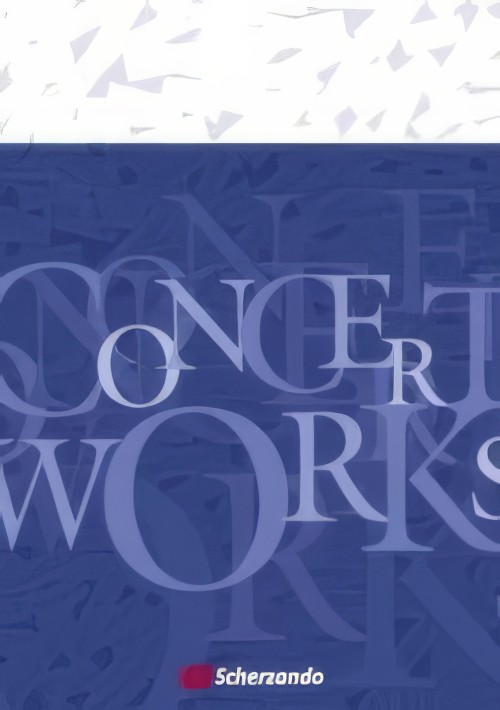 £209.99
£209.99Codon (Concert Band - Score and Parts) - Houben, Kevin
Codon is a term used in the field of molecular genetics to describe the interaction between the three elements that are important for both the creation and the preservation of life. Kevin Houben uses this term as a metaphor for the interaction between the conductor, the musicians and the committee of a concert band. They all have the same goal, to preserve the life of the band. This work consists of three movements, symbolising birth, life and death - either of a human being or a band. From the foundation of a band over good and bad times up to the optimistic future, this work will appeal to the soul of every band member in the world!Duration: 17:00
Estimated dispatch 7-14 working days
-
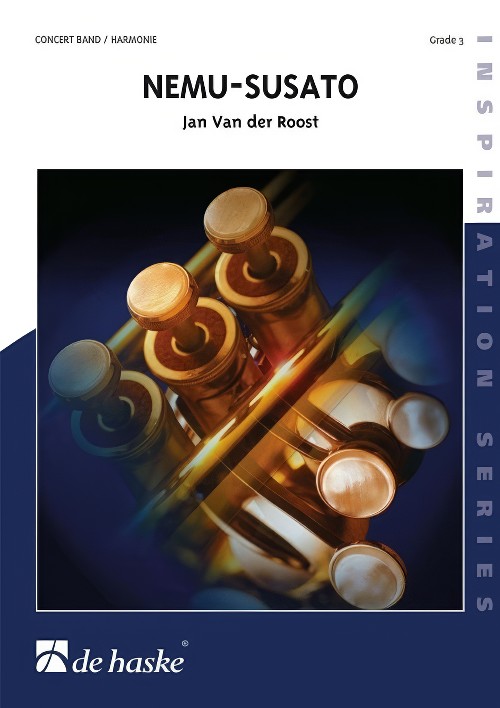 £149.99
£149.99Nemu-Susato (Concert Band - Score and Parts) - Van der Roost, Jan
Commissioned by the Japan Band Clinic Committee of Yamaha for the Nemu Band Directors Clinic in Nemu no Sato, May 18-20, 1997. The surprising title of this work is an indication of its content. By combining the somewhat similar names 'Nemu no Sato' and 'Susato' into a new word, Jan Van der Roost has produced a significant and interesting subject. The Yamaha corporation has extensive facilities in Nemu no Sato, Japan, including a concert hall, recording studios, hotel and so on. Concerts, workshops, clinics and other events are held here, including the annual Nemu Band Directors Clinic, which consists of numerous musical events. Jan Van der Roost served as guest conductor and speaker in 1994. He was invited again for the 1997 clinic, this time with a composition assignment. The difficulty level of his piece was to be Grade 2 - 3 bands. With this in mind, Mr. Van der Roost strove to create a renaissance-like sound. Simultaneously he wished to create a tribute to Tielman Susato who, like Jan Van der Roost, lived and worked in Antwerp in the 16th century. The first performance of Nemu-Susato was conducted by the composer, performed by the Tokyo Metropolitan Police Band, and took place during the Nemu Band Directors Clinic on May 19, 1997.Duration: 6.00
Estimated dispatch 7-14 working days
